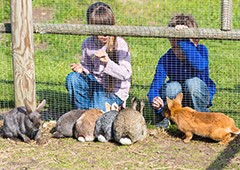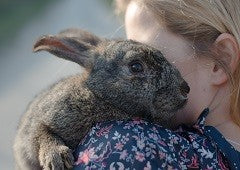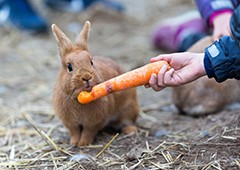They’re smaller than a cat, they’re quieter than a dog, and dare we say, cuter than a rat- a rabbit sure is the ideal pet!
Rabbits are charming little animals and can make delightful pets if given a little love and care. As well as being super cute and undeniably lovable, they are very sociable and intelligent creatures, so have certain needs that must be met to help them stay happy and healthy.
If you are new to the rabbit keeping business, you might be starting from square one in terms of rabbit keeping - what do they eat? Where do they live? Do they need grooming? This guide covers it all, and will help take the guesswork out of keeping and caring for these brilliant little creatures.
1. Housing
While many people opt to keep their rabbits in a cage indoors, they are also more than happy being kept outdoors, provided they are housed in a safe and secure hutch.
While bunnies can be quite delicate animals, keeping them in an outdoor environment is often healthier for them, as they have a very sensitive respiratory system that can be affected by things such as dust, cleaning products and musty air. Keep them outdoors in a well ventilated hutch will help your bunny will breathe easy!
To keep rabbits happy, safe and healthy in the great outdoors, their hutch must tick a few boxes.
-
Make sure their hutch is lovely and spacious- with both secure indoor and outdoor areas so they can hop about in the sunlight to their hearts content, then have an enclosed area to retreat to should the weather become weary.
-
Rabbits require mental stimulation to keep them on their toes, so add fun features such as ramps, tunnels and toys to your rabbits hutch to ensure they will never get bored. The Wiggle Den and Rabbit Den both have an extended run area and enclosed area to keep your rabbit hoppy and happy!
-
When looking for a hutch for your floppy eared friend, make sure that is it built from a sturdy and good quality weather resistant timber- your bunny is sure to be around for a long time, so their hutch needs to last the distance too!
-
What people fear most about keeping their precious pet outdoors is the pending threat of predators- dogs, cats and large birds can all spell disaster for a free-ranging rabbit. A hutch fitted with a fixed galvanised wire mesh, sliding bolts, locks and padlocks will make sure that your rabbit is well and truly out of reach of an pesky predators. Rabbits are very inquisitive creatures, so these fittings will also help to keep them from sneaking out to wander and bounce about in the great outdoors without your supervision. Luckily, The Wiggle Den and The Rabbit Den are made with all the highest quality materials to help ensure that your pretty little pet stays super safe.
-
Rabbits can often be sensitive to the climate, in particular- extreme heat. So it is important that their place to call home is well ventilated to keep them cool in the summer, and warm in winter- you don’t want steamy or chilly bunnies! The Wiggle Den and The Rabbit Den is fitted with a capped-off chimney and open-and-shut windows to make sure they are comfortable all year round.
-
Rabbits are very precious and quite timid animals, and it is natural instinct for them to hide away when they are spooked. This is why it is important that their home sweet home has a protected area where they will feel comfortable retreating to if it all gets a bit too much. This spot will also be where they sleep, so it should be in a draft-free and well ventilated area of the coop, and slightly raised off the ground. The best bedding to use is a layer of newspaper, with either straw, hay or shredded paper on top. This will keep bunny comfy and cosy. The Wiggle Den and The Rabbit Den both have sleeping nook areas when your delicate friend can hop away to, if they should ever feel vulnerable for any such reason.
Most rabbits are clean creatures, and will choose to do their business in one corner of the hutch- making your job of cleaning particularly easy! When it becomes apparent what area they have chosen, place a newspaper-lined litter box in this area and fill it with grass hay, or pelleted-newspaper litter. Soon enough you will have a litter-trained bunny on your hands! Make sure the litter box is changed and refreshed to keep their hutch smelling fresh and odour-free! Along with this, be sure to regularly change their bedding, clean their waterers and feeders and muck out the hutch to keep your bounding buddies home fresh and clean!
2. Diet & Feeding
The key to keeping your rabbit at the height of their health is diet. Good nutrition=good health! Fresh grass, hay and vegetables should make up the bulk of your rabbit's diet, with the addition of some pellets.
Fresh hay (such as timothy or oat hay) should be available to your bunny at all times. Hay provides fibre to your bunnies diet that is essential to their digestive health. Chewing hay also helps to wear down the continuously growing teeth of a rabbit, and is also a great boredom buster for them. You can buy hay from local feed or pet stores- place it in their hutch, being sure to refresh it often.
Rabbits sure do love their veggies! Depending on the size of your rabbit, 2-4 cups of varied veggies should be given daily. Because of their delicate digestive systems, vegetables should be gradually introduced to a rabbit’s diet. Only add one new vegetable at a time- this will allow you to pinpoint the culprit should your precious pet have an stomach issues such as diarrhea, so you can avoid feeding them this veggie in the future. Some great veggies your rabbit will love include carrots, carrot tops, turnip greens, romaine lettuce, kale and spinach- but limit spinach and kale to 3 meals per week as they are high in oxalates.
Beans, cauliflower, cabbage and potatoes can cause problems with your rabbit's digestive system, so it is best to avoid these. Other foods that are definite no’s include:
-
chocolate
-
biscuits
-
crackers
-
cereals
-
yoghurt
-
milk
-
pasta
-
bread
All of these and most other ‘human foods’ can cause serious health problems in your rabbit, so it is best to avoid them.
Because rabbit pellets are designed for commercial rabbit production, they can be quite high in calories, meaning if they are not controlled, you will have one chubby bunny on your hands! However, as they are rich and balanced in nutrients, they are an important part of a rabbit’s diet.
When choosing a good quality pellet (you can buy them from your local pet store), be sure that they have a minimum of 20-25% fibre, around 14% protein, and less than 1% calcium. Be sure to only purchase fresh and plain pellets- without seeds, nuts, or other coloured bits and pieces.
Up until 6 months, your bunny should have unlimited access to pellets, after that they should be limited to ⅛ to ¼ a cup per day per five pounds of their body weight to keep them fit and healthy.
Of course bunnies deserve to be spoilt from time to time, and because they are such sweet tooths, fruit is a great treat! However, moderation is key- only 1-2 tablespoons per day should be given to our furry little friends. Some fruits your bunny will love include, apples, melons, bananas (peeled), and berries!
Treats sold in pet stores are often high in sugar, salt and carbohydrates, so it is best to avoid feeding these to your rabbit- a tubby bunny is not funny!
Most importantly, fresh water should be available to your rabbit at all times- especially if you live in an area where the temperature is known to fluctuate. Place a few waterers, either a pet sipper bottle, a heavy bowl, or a plastic one that clips to the side of the hutch, in easy to access areas in the hutch. Remember to check and replace water daily- a dehydrated bunny, is an unhealthy bunny!
3. Grooming
Rabbits are wonderfully clean and hygienic animals, who will happily spend a great deal of time grooming themselves to perfection. While this means they do not generally requiring bathing, regular brushing will help to keep their coat in tip-top condition and prevent the instance of hairballs.
If you have a short haired rabbit, they should be brushed at least once a week (except when they are shedding, when more frequent brushing is required). It is best to use a bristle brush that is especially designed for rabbits, or a fine toothed comb- be sure to be especially careful, as their skin is quite delicate.
If you have an Angora rabbit (long haired), daily grooming and regular coat trimming is required, as they are particularly prone to matting and hairballs.
If your rabbit does develop mats in its coat- it does happen, gradually work it out by very gently separating and combing the hair out a little bit at a time, being careful not to pull on their sensitive skin. Never try to trim them out with scissors- it is far too easy to accidentally cut their skin!
Bathing is generally very stressful for a rabbit, so try and avoid them altogether. It is best to first try to spot clean the area, rather than putting them through the stressful experience of a bath. If absolutely necessary, keep in mind that it takes a long time for a rabbit to dry, so use a blow dryer on a warm setting to speed up the process.
Rabbits nails grow quite quickly, so trimming them regularly should also be a part of their grooming routine. You can use either human nail clippers, or nail scissors made especially for small animals.
Take a little time out to do these things, and your bunny will stay looking extra cute and oh so fluffy!
4. Spaying & Neutering
We all know the saying ‘breeds like rabbits’- which is why it is important that you get your pet rabbit spayed or neutered (desexed)- unless of course you want to be responsible for an abundance of little bunnies!
It is particularly important to help reduce the problem of rabbit overpopulation, which is already a serious issue- with far too many bunnies ending up at shelters or abandoned.
As well as this, there are many other advantages to desexing your rabbit, in terms of both behaviour and their health, this includes:
-
In females, it will help prevent a condition known as a ‘pseudopregnancy’ or false pregnancy, where hormonal changes will make the rabbit act as though she is pregnant. They will go through the usual motions of a pregnancy- nest building, milk production and they are known to become quite stressed and act aggressively towards other rabbits and people.
-
It will help to reduce aggressiveness associated with rabbits reaching sexual maturity. Chickens that are neutered/spayed tend to be calmer and easier to handle than those who aren’t. They are also known to be more affectionate towards you-awww!
-
In females, desexing will help to eliminate the risk of uterine, ovarian and mammary cancers. While in males it eliminates the risk of testicular cancer.
-
Desexing greatly reduces unfavourable territory marking behaviours such as urine marking and spraying, which helps make litter training easier.
Desexing is not a cruel nor painful procedure for a rabbit, and should be performed at around 4-6 months of age- when they reach sexual maturity.
5. Rabbit Health
We love and adore our little fuzzy butt friends, so of course we want them to always be at the height of their health. If your rabbit lives on a healthy diet, has a secure hutch, has space to bounce about and exercise, and gets lots of love and attention, he or she should live a relatively long, happy and healthy life. However, like with all animals, things can go wrong, so it is best to have the number of a local vet should you ever need help or advice. You should take your pet rabbit to the vet annually for a check-up, just to make sure everything with your cute little companion is in working order!
By paying close attention to your rabbits behaviour and appearance, you should be able to tell if they are feeling a little under the weather- giving them a simple once over regularly can make all the difference! There are a number of things to look out for in a healthy rabbit, these include:
-
Weight: if your rabbit is healthy, they will be lovely, slim and sleek. When holding your rabbit, you should be able to feel the ribs just under the skin- with no thick layer of fat. It is a good idea to weigh your rabbit monthly to make sure they aren’t rapidly losing or gaining weight.
-
Eyes, Ears & Nose: these should all appear clean and clear, with no evidence of discharge. If your rabbit seems to be shaking their head a lot and scratching around their ears- this could be a sign of ear mites, and so they should be taken to a vet for treatment.
-
Coat: a rabbit's coat should be shiny, flat and smooth. If you happen to find what looks like ‘dandruff’ in their coat, it is quite likely that they have mites, which will require treatment from a vet. Rabbits are also prone to getting fleas- especially if you have a dog or cat. If this is the case, you can buy an at home treatment from your vet, and use it per the instructions. As stated earlier, make sure you groom your rabbit regularly to keep their coat looking lovely and healthy.
-
Droppings: While it may not be the most delightful of tasks, checking out your rabbits droppings regularly is a great indication of their health. Rabbits have two different types of droppings- hard fibrous pellets and soft caecotrophs. As disturbing as it may seem, your pet rabbit will reingest their caecotrophs, and this is in fact a very important part of a rabbit’s digestion. If you notice that your rabbit has diarrhea, you should immediately stop feeding them all fruits and vegetables until you can work out what has caused it. Diarrhea can be fatal in rabbits, so if it continues, it is best to have them looked at by a vet.
-
Teeth: A rabbit’s teeth grow continuously throughout their life, and so teeth problems are common. To keep their teeth worn down and healthy, make sure that your provide them with quality chewing materials such as dried willow, apple and citrus tree branches.
If you are ever worried about your rabbit's health and wellbeing for any reason, it is best to seek the advice of a vet- while it may be nothing, it is always better to be safe than sorry- especially when it comes to your beautiful little bunnies’ health!
6. Bunny Bonding & Love
Perhaps the most important thing you can do to keep your precious pet happy, healthy and hoppy is give them lots of love and attention! Bunnies are very sociable creatures, and crave companionship- from both their own kind and their owners.
If you think you are unable to provide enough company to keep your rabbit content, it is best to get a pair- they are known to form very strong and powerful bonds, that will be evident when you catch them cuddling up close together or grooming one another.
It may not be instantaneous, but if you work with your two rabbits on a regular basis, it won’t be long before it will be impossible to catch them apart.
As well as having another cuddly companion, you too need to show your bunny a lot of lovin’. Bond with your bunny by playing with them, snuggling and patting them, or letting them follow and bounce about while you potter about the house or garden- you will both equally delight in the adoring companionship!
Rabbits are such delightful little pets, and while they do require a certain amount to of care to keep them happy and healthy, if you provide them with it, they in turn will give you an endless supply of love and affection, and a lifelong companion.




















